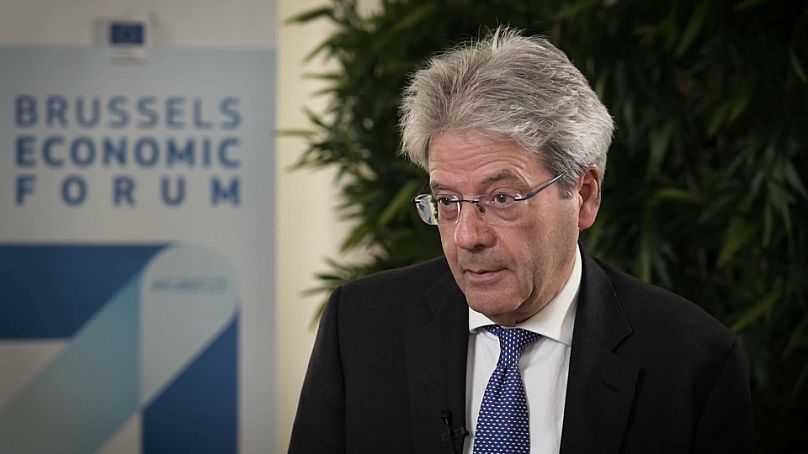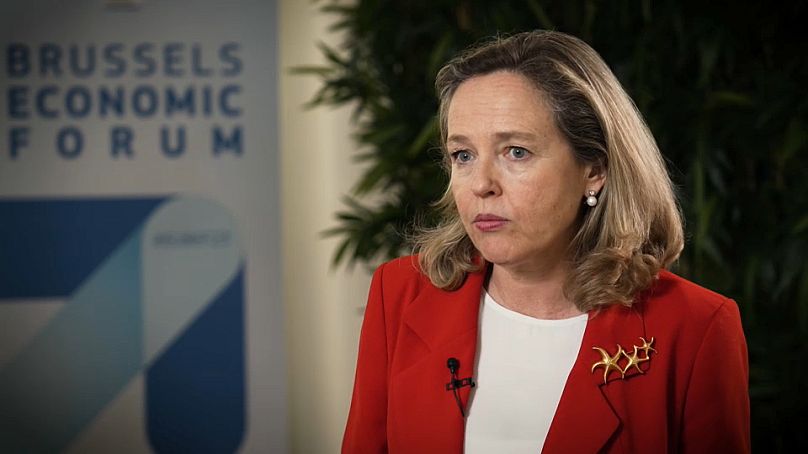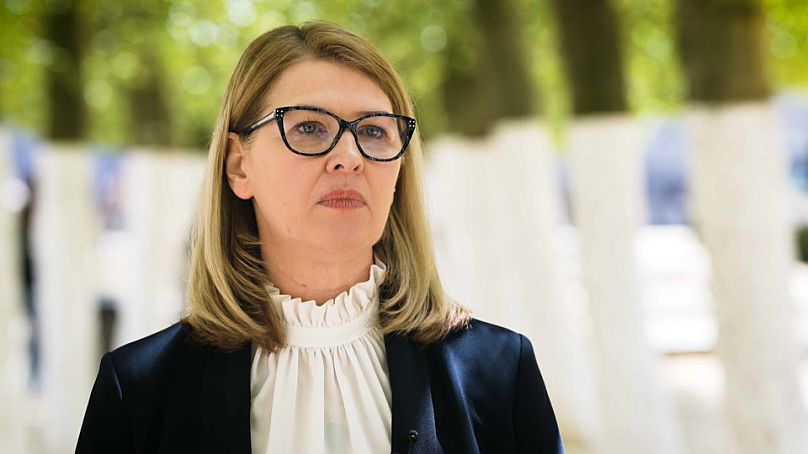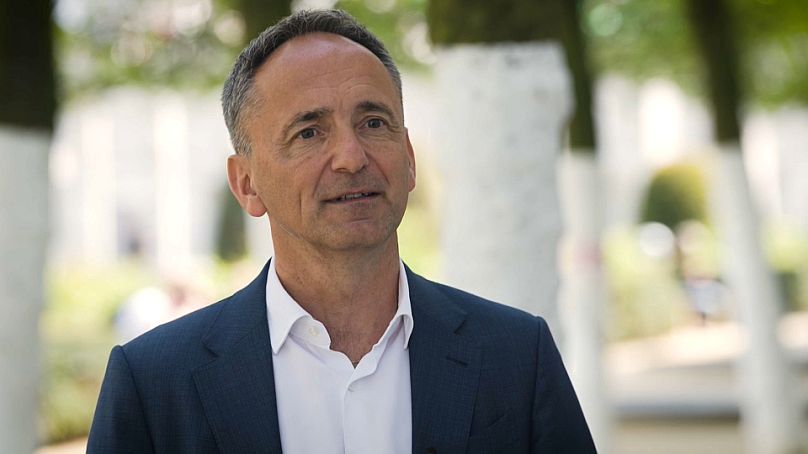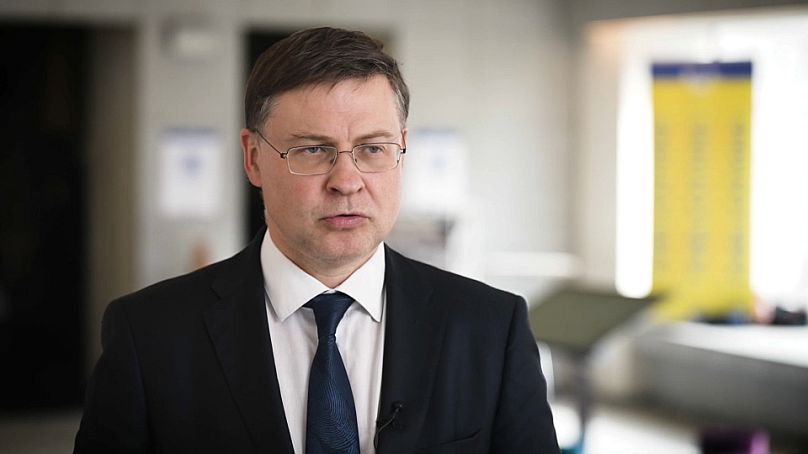In this episode of Real Economy, we travel to the Brussels Economic Forum to ask high-level decision-makers how the EU can shape its digital, green and economic policies while ensuring the protection of its workers, industries, and consumers.
With war raging in Ukraine, the effects of climate change tightening their grip, a scarcity of resources, and global competition to acquire them, Europe is facing a multitude of challenges.
 ADVERTISEMENT
ADVERTISEMENT
 ADVERTISEMENT
ADVERTISEMENT
But in its latest economic forecast, the European Commission predicts a continuous slowdown of the EU’s inflation rate, from 9.2% in 2022 to 6.4% this year and 2.8% next year.
And, after falling from 3.5% in 2022 to 0.8% this year, GDP growth in the EU should pick up steam again and reach 1.6% in 2024.
Speaking to Euronews at the Brussels Economic Forum (BEF), the European Commission's flagship annual economic event, the EU's Commissioner for the Economy told Euronews that these figures generate a sense of cautious optimism.
[The situation is] better than expected," Paolo Gentiloni told Euronews. "If we look back to a few months ago, we were estimating a much worse situation [where] we had some concerns on energy supply, even thinking [about] possible blackouts. And a lot of concern [about] the possibility of a recession, and bankruptcies."
The BEF coincided with the European Central Bank’s decision to raise again its key interest rates, in a bid to curb inflation. Commissioner Gentiloni said he was not worried about the potential impact on growth.
However, another recent development could be a matter of concern for jobs in the EU and even trigger new legislation: Artificial intelligence.
"We need a set of rules. And we European Union, we are [the] master of rules. So I'm quite confident that we will have good rules also on artificial intelligence," Gentiloni added.
Europe's green and digital transition
Digitalisation, along with the dire consequences of the climate crisis are two of the main drivers pushing Europe’s economic transition. For Member states, this means greater investments in education and training.
"This is probably one of the key challenges we have going forward: how to ensure that we are leading these transitions, the twin digital and green transformation, that we are leading them from a technological point of view," explained Nadia Calviño, Spain's Minister for the Economy and Digital Transformation.
"And those sectors that are proving to be the most dynamic in job creation are linked to new technologies, information technologies, science, research, health…And this shows that the structural transformation is underway of the Spanish economy."
"And we are investing around €4 billion of NextGenerationEU funds to underpin a very ambitious digital skills programme to ensure that our schools, our universities, but also the elderly, have access to those skills which are going to be essential," Calviño added.
Addressing Europe's social inequalities: Taxation and public spending
Despite an unemployment rate of only 6% in the European Union, one-fifth of the EU population is still at risk of poverty or social exclusion.
The cost-of-living crisis and rising inequalities are fueling social unrest and distrust in politics.
Gabriel Zucman, a Professor of Economics at the University of California, Berkeley, told Euronews that Europe needs to rethink its public revenue sources and start taxing the rich.
"Almost all social groups in the EU, and within each Member state, they pay a lot in taxes. Because we have a social model that relies on significant levels of taxation. That’s true for almost all social groups with one big exception, which is the truly wealthy," he explained.
"There is a need for government revenues today in the context of high public debts, rising interest rates. We should start by collecting revenues from the groups of the population that pay significantly less taxes than the rest of us. And that means today, in 2023, it means the very wealthy."
This is a call shared by the European trade unions, which argue that new public revenue sources are one way to increase social justice. Another way is through public spending.
"The rules need to change," said Liina Carr, the Confederal Secretary at the European Trade Union Confederation. "We think that keeping that rigid 3% deficit level is actually not conducive in any way for public spending and investments because it is still limiting what the governments can do."
"There has been also a debate that maybe some investments should be excluded from the debt and deficit rules like investment in greening, in digitalisation, investment in health, investment in education. The kind of investments that really prop up the economy and make sure that economies remain strong," she added.
This debate has gained momentum in the EU, especially after the American Inflation Reduction Act of 2022.
With a massive allocation of $369 billion (€334 billion) towards promoting clean technology in the US, there is anxiety in Europe about being sidelined in the green transition.
But according to Siemens AG Chairman, Jim Hagemann Snabe, America’s Inflation Reduction Act could be an opportunity for Europe’s industrial ambitions.
"The Inflation Reduction Act for me is a catalyst for sustainable solutions. And so in that sense, it's good. Europe was first with this idea with the Green Deal, and now they are stepping up," he explained.
"I think the world is at an inflection point where we kind of have the technologies, we know how to rebuild energy systems to be renewable, how to reinvent transportation systems, how to make buildings carbon neutral."
"And this is a catalyst for companies to invest more, invest faster and create the scale we need so that we can create and deliver a more sustainable future."
The global race for resources
However, Europe’s green and digital transition hinges on critical raw materials, like lithium, cobalt and rare earth elements, of which the EU produces very little. China, on the other hand, accounts for 86% of the rare earth supply.
At a time of soaring geopolitical tensions, this reality is shaping Europe’s trade relations, according to the European Commission’s Vice-President, Valdis Dombrovskis.
"That’s why we put forward the raw materials strategy in the EU to boost domestic production and also have external supplies," Dombrovskis revealed.
"So the aim for 2030 is to get 10% of extraction and mining domestically within the EU. It means 90% still would need to come (from) outside the EU."
"And that's why those partnerships with other countries will be very important. We do it through raw materials chapters in our trade deals. We are developing bilateral raw materials partnerships with different countries."
The invasion of Ukraine by Russia is a stark reminder of the importance of reducing dependency on energy supplies.
Yet, as the climate crisis intensifies, aligning this objective with the sustainable management of scarce resources will remain a major challenge in the years to come.











